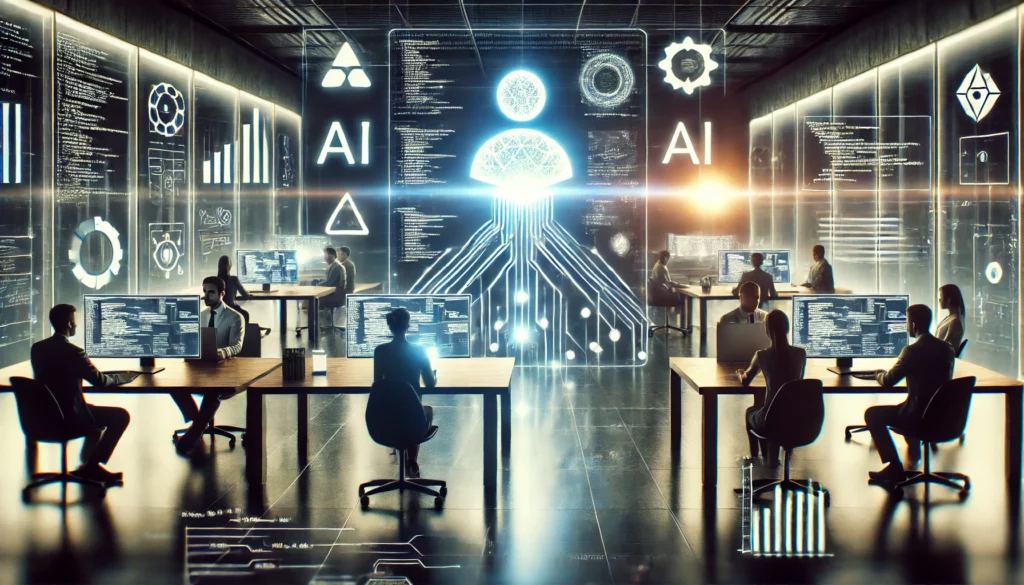
While artificial intelligence is transforming various industries worldwide, its impact on software development is especially significant. AI-powered tools are enhancing code quality and efficiency and redefining how teams work together in collaborative environments. As AI continues to evolve, it's becoming a key player in reconfiguring team dynamics, enhancing productivity, and streamlining communication. This article explores how AI redefines team dynamics in collaborative software development, unlocking new ways of working and shaping the industry's future.
The Shift to AI-Augmented Development
In the past, software development relied heavily on human expertise at every stage, from design and coding to testing and deployment. While this traditional approach has driven significant progress, it faces bottlenecks, including inefficiencies, communication barriers, and human errors. Recent advancements in AI, however, are offering intelligent solutions that effectively address these challenges, transforming how development teams operate.
AI-augmented development redefines team collaboration by automating routine tasks such as bug detection, code reviews, and version control. By handling these repetitive tasks, AI allows developers to focus on more complex, higher-order problems, improving their productivity and efficiency. This automation also promotes effective collaboration by minimizing bottlenecks and reducing the need for constant manual intervention.
Enhancing Cross-Functional Collaboration
AI's impact goes beyond just coding; it's becoming vital for enhancing collaboration among teams, especially in agile development environments. Software development relies heavily on teamwork, shifting responsibilities between developers, testers, product managers, and business users. These teams must interact and communicate effectively to achieve their shared goals. AI tools are helping to break down the traditional silos that often get in the way of effective communication.
For instance, AI-driven project management platforms like Asana and Jira optimize task allocation by analyzing team performance and identifying skill gaps. These platforms predict potential roadblocks and suggest workflows that ensure tasks are assigned to the most appropriate team members, improving project outcomes. AI also assists in forecasting timelines, reducing project delays, and providing data-driven insights that help team leaders make more informed decisions.
Boosting Remote and Distributed Teams
In today’s globalized world, remote work has become the norm for many software development teams. Distributed teams often face challenges related to communication, coordination, and maintaining productivity across time zones. AI is crucial in bridging these gaps and ensuring that remote teams remain as effective as co-located ones.
Additionally, AI is transforming code review processes for remote teams. Tools like Codacy and CodeClimate use machine learning algorithms to automate code reviews, ensuring that teams follow best practices even when senior developers are not immediately available for oversight. This mechanism accelerates the review process and maintains consistency in code quality merged into the project.
AI and Continuous Integration/Continuous Delivery (CI/CD)
One of the most significant shifts AI drives in team dynamics is in continuous integration and continuous delivery (CI/CD). AI-powered tools enhance CI/CD pipelines by automating various aspects of the software development lifecycle, from testing to deployment.
AI-driven CI/CD fosters better collaboration among developers and operations teams (DevOps). By automating routine deployment tasks, AI allows DevOps teams to focus on strategic improvements and infrastructure scalability instead of constantly dealing with deployment issues. This enhances the synergy between development and operations teams, creating a more cohesive workflow that aligns with the project's broader goals.
Democratizing Software Development
As AI increasingly integrates into collaborative development environments, software development becomes more accessible to everyone. AI-powered low-code and no-code platforms are allowing non-developers to contribute to software projects in ways that were previously impossible.
Platforms like OutSystems and Appian use AI to guide users through the software development process, enabling business analysts, project managers, and clients to create functional applications without extensive coding expertise. This democratization shifts the traditional dynamic of software teams, where developers are the sole gatekeepers of technical knowledge. Now, diverse teams can actively participate in the development process, contributing to innovation and bringing new perspectives.
AI as a Team Member: The Rise of AI Pair Programming
One of the most fascinating developments in AI-assisted software development is the concept of AI as a virtual team member. AI pair programming, where a human developer collaborates with an AI tool to write and review code, is gaining traction.
AI is changing traditional team dynamics by being a constant collaborator. It is reducing the need for junior developers to rely heavily on senior colleagues for guidance. AI tools can now provide that guidance in real time, helping to level the playing field and accelerate the onboarding process for new team members.
The Bottom Line
AI is not just a tool for improving efficiency; it fundamentally reshapes how teams collaborate and innovate in software development. By automating routine tasks, enhancing cross-functional communication, and enabling more inclusive and democratized development processes, AI is setting the stage for a new era of teamwork.
As AI continues to advance, the future of collaborative software development looks promising. Human creativity and AI-driven automation will work together to unlock new levels of productivity and innovation. Teams will be able to confidently tackle increasingly complex projects, knowing that AI is there to support them at every turn.
The original content of the note was published on Unite.ai. To read the full note visit here